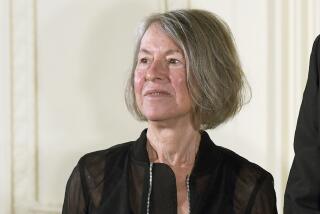Maxine Kumin, Pulitzer-winning poet, dies at 88
- Share via
Maxine Kumin, the Pulitzer Prize-winning New England writer and onetime U.S. poet laureate, began writing poetry in the 1950s. She hated it when early mentors told her they liked her work because “she wrote like a man.” Alongside her friend and collaborator Anne Sexton, she embarked on a career that helped redefine what American poetry could be.
On Thursday, Kumin died at the age of 88. Her death was reported on the website of the American Academy of Poets. No cause was given.
Kumin wrote 18 poetry collections spanning six decades--her final book, “And Short the Season,” will be published this spring by W.W. Norton. Since the 1970s, she lived in Warner, N.H., raising horses with her husband on a 200-acre farm.
She was born in 1925 in the Germantown community of Philadelphia, to a “nominally observant Reform Jewish family that lived next door to the Convent of the Sisters of St. Joseph,” according to a biography on her website. She attended primary school among the sisters, a fact that accounts for “the juxtaposition of Jesus and Jewish rituals” in many of her poems.
But much of her work would be grounded in New England--she moved there as a Radcliffe College student. Critics variously described her as a transcendentalist (like Thoreau), a confessional poet (like Sexton) and as a regional pastoral poet whose work shared enough concerns with a certain famous New Englander that she was nicknamed “Roberta Frost.”
In the 1976 “Excrement Poem,” Kumin writes about shoveling horse manure. She begins with these lines:
It is done by us all, as God disposes, from
the least cast of worm to what must have been
in the case of the brontosaur, say, spoor
of considerable heft, something awesome.
In a remarkable oral history published in September in the Concord Monitor, Kumin described her battles with male-centered academia and poetry circles to find a voice. Eventually, the women’s movement helped to shift what female poets felt they could write about.
“It’s OK for women to write about their bodies now,” she said. “It’s all right to write about childbirth. There is no subject that’s off-limits. I like to say I wrote my excrement poem to prove that point – that you can write about s---.”
Kumin outlived her friend Sexton by several decades. She was with Sexton on the day Sexton committed suicide in 1974. She told the Concord Monitor that Sexton’s death marked her for the rest of her life.
“Anne Sexton helped me to open up in ways that I might not have achieved on my own. I think about Anne’s suicide constantly. It’s fresh. I don’t think it will ever fade. I think I have finally forgiven her.”
Kumin published half a dozen novels and many children’s books, but it was the poetry for which she was best known.
She won the 1973 Pulitzer Prize for her collection “Up Country: Poems of New England,” and her 2011 collection “Where I Live: New and Selected Poems” was the winner of the Los Angeles Times Book Award.
ALSO
Happy Birthday, Charles Dickens
Philip Roth says he’s quit writing ficiton
Authors call on Putin to release ‘chokehold’ on expression
More to Read
Sign up for our Book Club newsletter
Get the latest news, events and more from the Los Angeles Times Book Club, and help us get L.A. reading and talking.
You may occasionally receive promotional content from the Los Angeles Times.










